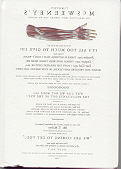It's a very special
Maglog...
A Library Maglog Spectacular!
Featuring:
(1)

Baker, Nicholson, "Deadline:
A desperate bid to stop the trashing of America's historic newspapers",
The New Yorker July 24, 2000
One of the most exciting
articles I have read this year was a twenty page article on the history
of newspaper preservation through microfilming. It's freaking brilliant.
Nicholson Baker unearth's
the fact that America's historical newspapers have been, by and large,
discarded by libraries and replaced with a format that is often unreadable.
As Baker explains, newspapers provide a unique and rich source of historical
fact and commentary. He considers the loss of the material so tragic, that
he invests a significant amount of his own time and money to purchase and
store as many volumes as he can.
(further
discussion of this article)
Baker deserves some sort
of award. Perhaps a MacArthur Genius Grant.
(Hmm.. or maybe not. There's
a spirited rebuke from the side of the librarians from
First Monday)
(2)

Roberts, Siobhan, "Broken
Records", Saturday Night Magazine, November 4, 2000, p. 35
An
enlightening article on Canada's National Archives.
(3)

McSweeney's #5. Cover No.
3
One of the most positive
and most realistic things I have read recently regarding e-books and electronic
publishing (I'm a librarian and have been reading quite a bit about the
topic) has come from the humble small print that begins McSweeney's Magazine
Edition V:
You see, when everyone
is talking about electronic books -- is that what they're called? -- and
about books-on-demand (see Rodney
Rothman's experience with those, page 47), and about the future of
books and all, we think that the direction we should be going is obvious
and is in some ways the opposite of the way most people are talking about
going. Out theory holds that a) People like hardcover books. They like
them because they are good to look at, and are permanent, and are decorative,
and can be given as gifts, and kept until one dies; b) However, hardcover
books are often unaffordable; and so c) People reluctantly wait to buy
certain books in paperback form; but d) Given how accessible the technology
-- not just the typesetting technology, butt bookselling technology (for
instance, Amazon.com, on which anyone can sell any book), just about anyone
can (or should be able to) easily print a book in a hardcover way, and
still charge what they're starting to charge for paperbacks -- $14! --
and thus expect nice sales (see a & b above), while bringing home a
much greater net proceed. Does this make sense? In short, we are talking
about smaller and leaner operations that use the available resources and
speed and flexibility of the market (i.e., the web and other consumer-driven
methods), to enable us to make not cheaper and cruder (print-on-demand)
books or icky, cold, robotic (electronic) books, but better books, perfect
and permanent hardcover books, to do so in a fiscally sound way, and to
do so not just for old-time's sake, but because it makes sense and gives
us, us people with fingers and eyes, what we want and what we've always
wanted beautiful things, beautiful things in our hands -- to be surrounded
by little heavy papery beautiful things.
Incidentally, McSweeney's
Magazine Edition V is a beautiful papery hardcover book.
|

